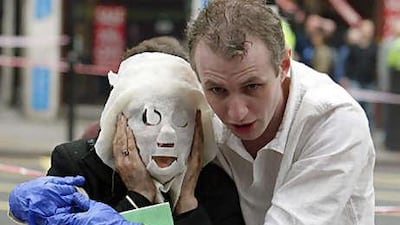LONDON // Mainstream Muslims are marking today's fifth anniversary of the suicide bombings that killed 52 people on London's transport system with a renewed effort to build bridges with the UK's Christians and Jews.
Public events to mark the anniversary of the 7/7 attacks - the worst terrorist atrocity in British history - will be deliberately low key with only a single wreath, bearing a message from the prime minister, David Cameron, being laid by a civil servant this morning at the memorial of 52 steel pillars in Hyde Park. The department for culture, media and sport said yesterday that the bereaved families and loved ones had requested that lower-profile events be held this year than in previous years.
A spokesman explained: "The families wanted to mark this year in a private way. There has already been a big event with the opening of the memorial last year." For Muslims, though, each anniversary of 7/7 brings a time of reflection on their place in society and how the explosions on a bus and three underground trains by four British-born Muslims produced a lasting stigma on their religion and beliefs.
More than ever this year, there will be a determined effort to mend fences. Across the country, inter-faith groups will hold services and ceremonies dedicated to distancing them from the type of religious fanaticism that produced the attacks. This afternoon in the House of Lords, a new book, 7/7: Muslim Perspectives, in which 25 Muslims recount their emotions on the day and their experiences in the ensuing five years, will be launched.
Murtaza Shibli, the book's editor, said yesterday: "The voice and views of the ordinary British Muslims have been lost amongst the endless debates and analysis. "This book offers a chance to find out what normal people experienced and how this watershed event has had an impact on their lives both as British citizens and as Muslims." Robert Lambert, a lecturer at the University of Exeter's department of politics and co-author of Islamophobia and Anti-Muslim Hate Crime, said the bombings fuelled the "rampant Islamophobia" present in the UK today. "While the collection highlights the heterogeneous nature of Muslims in Britain it does, nevertheless, highlight the extent to which populist accounts of the significance of the bombers' Muslim identities has had the adverse consequence of stigmatising all Muslims as terrorists and extremists," he said.
"Not only does this outstanding collection reveal the paucity of such a reductionist account of 7/7, it also demonstrates the creativity, richness and diversity of Muslim experience in Britain that is the antithesis of violent extremism of all kinds." Hadiya Masieh, who belonged to the radical Hizb ut-Tahrir group for a decade before dedicating herself to the fight against extremism after the 7/7 bombings, organised a meeting in west London last night of 100 Orthodox Jewish and Muslim women.
Mrs Masieh, 32, was pregnant with her third child when she went to a London hospital for tests on July 7, 2005. "I was in the hospital room having nurses doing tests on me, but watching the television screen," she told The Observer newspaper this week. "It was then that it suddenly hit me that this was not a film - this was happening in London, the city I called home." Two weeks later, she gave birth to her child as a second wave of terrorist attacks on the transport system in London was foiled. She decided to embrace a more tolerant version of Islam.
"The 7/7 bombers and the people I knew at Hizb ut-Tahrir were two sides of the same coin," she said. "Hizb ut-Tahrir says it does not believe in violence, but the violence was never condemned; they just didn't think it would achieve anything." Today, Mrs Masieh works for the Three Faiths Forum, an organisation seeking to build bridges between the three major faiths. Amjal Masroor, an imam at four London mosques, recounted his experiences in an interview with the Daily Mirror yesterday. "In every place I went to on the day of the bombings, I remember a deep sense of frustration, as well as anger," he said.
"If I had it my way and if I could meet them [the bombers], I would have told them: 'If you have done it in the name of your religion, you've done a rotten thing. Your religion doesn't sanction it. Allah's wrath will be on you. You've bought yourself a one-way ticket to Hell'." dsapsted@thenational.ae

